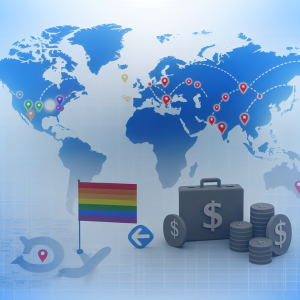Why LGBTQ+ Travelers Are Rethinking the U.S. — And What Investors Must Know Now
A seismic shift is underway in the travel habits of LGBTQ+ consumers, one of the most affluent and economically impactful demographics globally. Recent data reveals a notable pullback from U.S. destinations, driven by a potent mix of geopolitical tensions, domestic policies, and cultural climate. For investors and advisors, understanding this evolving landscape is not just about spotting trends—it’s about anticipating the ripple effects across sectors and repositioning portfolios accordingly.
The New Travel Calculus: Values Meet Economics
Take Robert Sharp, a Canadian entrepreneur who owns Out Adventures, an LGBTQ-friendly travel company. Sharp, like many others, has recalibrated his travel plans away from iconic U.S. LGBTQ+ hubs like Provincetown or Fort Lauderdale, opting instead for Canadian destinations such as Montreal or a Rockies road trip. His decision underscores a broader phenomenon: international LGBTQ+ travelers are increasingly factoring in political and social climates when choosing where to spend their travel dollars.
This shift is quantifiable. The International Trade Administration reports a 10% year-over-year drop in foreign visitors arriving by air to the U.S. in March 2025, with total inbound visitors—including land crossings—down 14%. Oxford Economics projects an $8.5 billion decline in spending by international visitors this year, a direct hit to sectors reliant on tourism dollars.
The “Rainbow Dollar” as Activism
What’s particularly striking is how LGBTQ+ travelers are using their purchasing power as a form of activism. Misterb&b, a leading LGBTQ+ travel platform, recorded a 66% drop in Canadian bookings and a 32% drop in European bookings for U.S. queer-friendly accommodations from February to April 2025 compared to the previous year. Conversely, bookings surged 22% in “blue” states, while “red” states saw declines.
Misterb&b CEO Matthieu Jost highlights that LGBTQ+ travelers are not reducing travel overall—they are redirecting it. This is a critical insight: the LGBTQ+ community is voting with their wallets, choosing destinations that align with their values of inclusion and safety.
Economic and Social Implications for Investors
The LGBTQ+ travel market is a powerhouse, estimated at $296.8 billion globally in 2023 and projected to more than double to $634.9 billion by 2033 (Market.US). Research from Arival Travel reveals LGBTQ+ travelers often have household incomes exceeding $150,000 and spend more on experiences than average tourists.
What does this mean for investors?
-
Hospitality and Tourism Stocks: Companies and destinations that actively promote inclusivity and safety are likely to outperform. Investors should scrutinize hotel chains, airlines, and travel platforms for their LGBTQ+ policies and market positioning. For instance, brands that have visibly supported Pride events or implemented non-discrimination policies may capture a growing share of this lucrative market.
-
Regional Economic Impact: Cities in blue states or countries with progressive LGBTQ+ policies may see an economic boost, while red states and regions with exclusionary policies risk losing tourism revenue. For example, Salt Lake City and Phoenix have seen rising Pride event attendance despite being in traditionally conservative states, indicating pockets of opportunity.
-
Corporate Sponsorship and Event Investments: Pride events remain vibrant, but some organizers report a 25% drop in corporate sponsorships due to economic factors and political climates. Investors in companies that sponsor these events might see shifts in marketing strategies and ROI.
What Advisors and Investors Should Do Differently
-
Incorporate ESG and DEI Metrics: Evaluate investments through the lens of Environmental, Social, and Governance (ESG) criteria, with a particular focus on Diversity, Equity, and Inclusion (DEI). Companies demonstrating authentic commitment to LGBTQ+ rights may offer more resilient returns.
-
Monitor Policy Developments: Stay abreast of legislative and executive actions affecting LGBTQ+ rights, as these directly influence consumer behavior and corporate reputations.
-
Diversify Geographic Exposure: Consider reallocating exposure toward regions and companies benefiting from the LGBTQ+ travel shift, including Canadian markets and progressive U.S. states.
-
Engage with Niche Travel Platforms: Platforms like misterb&b provide unique data and insights into LGBTQ+ travel trends. Advisors can leverage these to advise clients on emerging opportunities in travel and hospitality.
Looking Ahead: What’s Next?
The intersection of politics, culture, and economics in LGBTQ+ travel is a bellwether for broader consumer activism trends. As global travelers increasingly align spending with values, industries must adapt or risk obsolescence. For investors, this means watching beyond traditional financial metrics and tapping into social currents shaping market demand.
A recent survey by the International LGBTQ+ Travel Association indicates growing hesitation among international travelers to attend U.S.-based events like the upcoming global convention in Palm Springs. This hesitancy signals a potential long-term realignment in travel flows that could reshape global tourism patterns.
In sum, the “rainbow dollar” is not just a symbol of pride—it’s a powerful economic force with the potential to influence markets and investment strategies profoundly. Investors who recognize and act on this shift early will be best positioned to capitalize on the evolving landscape of inclusive travel and tourism.
Sources: International Trade Administration, Oxford Economics, Market.US, Pride Co-Op, Arival Travel, International LGBTQ+ Travel Association.
Source: Some international LGBTQ+ travelers pull back on U.S. trips

